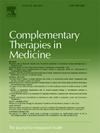Can strength training modulate inflammatory markers in postmenopausal women with overweight and obesity? Evidence from a 12-week quasi-experimental study
IF 3.5
3区 医学
Q1 INTEGRATIVE & COMPLEMENTARY MEDICINE
引用次数: 0
Abstract
Background
Many postmenopausal women with overweight and obesity are in a state of low-level chronic inflammation for a long period. This inflammatory state makes them vulnerable to a variety of chronic diseases. Exercise is an important complementary modality for managing inflammation. However, the effect of strength training (ST) on inflammatory markers is controversial. Therefore, this study aimed to investigate the effects of strength training on inflammatory markers in postmenopausal women.
Methods
This quasi-experimental study assigned 48 postmenopausal women with overweight/obesity to either a Strength Training group (SG, n = 24) or a Daily Activity group (DG, n = 24). The SG underwent exercise intervention 3 times a week for 12 weeks, and the DG kept their daily life habits unchanged. Serum C-reactive protein (CRP), interleukin-6 (IL-6), tumor necrosis factor-α (TNF-α), and adiponectin were measured before and after each intervention.
Results
After the 12-week ST intervention, a repeated ANOVA showed that CRP (F=16.85, P < 0.001, Partial η²=0.26), TNF-α (F=13.28, P < 0.001, Partial η²=0.22), and in terms of adiponectin (F=5.45, P = 0.02, Partial η²=0.106) There was a significant group × time interaction effect. CRP levels in the SG decreased by 21.30 % compared to the pre (1.69 ± 0.41 vs. 1.33 ± 0.29), which was statistically significant compared to the DG (P < 0.01); TNF-α levels in the SG showed a significant difference compared to the DG (P < 0.01), but within-group analysis showed that there was no significant difference in TNF-α from baseline ( P > 0.05); In the SG, the levels of IL-6 and adiponectin did not show statistically significant differences compared to the DG (P > 0.05). However, adiponectin was significantly decreased in DG (p < 0.01).
Conclusions
A 12-week ST intervention significantly decreases CRP levels in postmenopausal women with overweight and obesity; there may have been an inhibitory effect on the rise in TNF-α levels; the modulatory effects on IL-6 are not statistically significant; there may have been an inhibitory effect on the decrease in adiponectin levels. In future studies, dietary habits could be considered in combination with other lifestyle factors to explore the potential impact of these combined interventions on markers of inflammation in postmenopausal women with overweight and obesity.
力量训练能调节绝经后超重和肥胖妇女的炎症标志物吗?证据来自一项为期12周的准实验研究。
背景:许多绝经后超重和肥胖妇女长期处于低水平慢性炎症状态。这种炎症状态使他们容易患上各种慢性疾病。运动是控制炎症的重要补充方式。然而,力量训练(ST)对炎症标志物的影响是有争议的。因此,本研究旨在探讨力量训练对绝经后妇女炎症标志物的影响。方法:这项准实验研究将48名超重/肥胖的绝经后妇女分为力量训练组(SG, n=24)和日常活动组(DG, n=24)。SG每周进行3次运动干预,持续12周,DG保持日常生活习惯不变。检测各组干预前后血清c反应蛋白(CRP)、白细胞介素-6 (IL-6)、肿瘤坏死因子-α (TNF-α)、脂联素。结果:经12周ST干预后,重复方差分析显示CRP (F=16.85, p0.05);SG组IL-6、脂联素水平与DG组比较,差异无统计学意义(P < 0.05)。脂联素在DG组显著降低(p < 0.01)。结论:12周ST干预可显著降低绝经后超重和肥胖妇女的CRP水平;可能对TNF-α水平的上升有抑制作用;对IL-6的调节作用无统计学意义;可能对脂联素水平的降低有抑制作用。在未来的研究中,可以考虑将饮食习惯与其他生活方式因素结合起来,探索这些联合干预措施对绝经后超重和肥胖妇女炎症标志物的潜在影响。
本文章由计算机程序翻译,如有差异,请以英文原文为准。
求助全文
约1分钟内获得全文
求助全文
来源期刊

Complementary therapies in medicine
医学-全科医学与补充医学
CiteScore
8.60
自引率
2.80%
发文量
101
审稿时长
112 days
期刊介绍:
Complementary Therapies in Medicine is an international, peer-reviewed journal that has considerable appeal to anyone who seeks objective and critical information on complementary therapies or who wishes to deepen their understanding of these approaches. It will be of particular interest to healthcare practitioners including family practitioners, complementary therapists, nurses, and physiotherapists; to academics including social scientists and CAM researchers; to healthcare managers; and to patients. Complementary Therapies in Medicine aims to publish valid, relevant and rigorous research and serious discussion articles with the main purpose of improving healthcare.
 求助内容:
求助内容: 应助结果提醒方式:
应助结果提醒方式:


